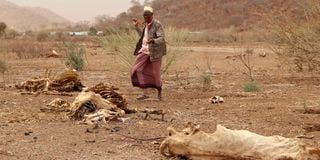3.1 million Kenyans are starving, says President William Ruto

Mr Abdi Boru shows carcasses of cows that have died due to drought in Dabel village, Marsabit County on August 24, 2022. People in the area are staring at starvation.
What you need to know:
- President also trained his gun on developed countries about a fund they pledged to create in 2009 that would help developing countries cope with the effects of climate change but had not.
- Dr Ruto noted that at the forthcoming COP27, Kenya will be taking a prominent role in calling for the actualisation of the climate change fund.
- Dr Ruto said the climate change fund can ensure developing countries don’t have to divert resources into providing food and water like Kenya has done.
The government has reorganised its budget to cater for relief food in drought-stricken areas, President William Ruto has said.
Dr Ruto says 3.1 million Kenyans in northern Kenya are in dire need as a result of failed rains. Speaking with Al Jazeera in an interview aired yesterday morning, he also trained his gun on developed countries about a fund they pledged to create in 2009 that would help developing countries cope with the effects of climate change but had not.
“We have had to reorganise our budget so that we can deploy resources for food relief in those areas. They have not harvested the last four years. They’ve had failed rains for the last four seasons. They have lost 70 per cent of their livestock,” said Dr Ruto.
“Thirteen years ago, pledges were made for $100 billion every year. Nothing has been forthcoming. I think it’s time for us to have a candid conversation with our partners, with the international community, especially those of us from the continent of Africa where we are bearing the brunt of the effects of climate change without any support.”
Dr Ruto noted that at the forthcoming COP27 (27th gathering of the Conference of Parties that form the United Nations Framework Convention on Climate Change) that will happen in Egypt in November, Kenya will be taking a prominent role in calling for the actualisation of the climate change fund. “Kenya will be looking at COP27 to provide the framework for financing climate adaptation.”
Being the big emitters that contribute to global warming and other adverse changes on the climate, industrialised countries had promised to create a fund that can help developing countries deal with droughts and other calamities.
Last year, Environment Cabinet Secretary Keriako Tobiko said industrialised countries release about 85 per cent of the harmful emissions into the atmosphere globally, but Third World countries suffer the most for the consequences of climate change.
Dr Ruto said the climate change fund can ensure developing countries don’t have to divert resources into providing food and water like Kenya has done.
“That’s no longer a very simple matter. That’s why those of us from the Global South, specifically from Africa, want a real, candid conversation on climate change and how we can deal with the people that are affected,” he said.
The wide-ranging interview on Al Jazeera touched on local politics, diplomacy, and issues around Dr Ruto as a person.
Asked why he let his predecessor Uhuru Kenyatta continue spearheading peace conversations in Ethiopia and the Democratic Republic of Congo (DRC) despite not having Mr Kenyatta’s support in his clamour for presidency, Dr Ruto said the campaign period was now a bygone.
“I am now the President of Kenya. I’m the big brother now. It is in my place to work with him. I think it’s the right thing to do. I will not allow negative energy to be built around our country,” he said. “I beat his candidate. That’s a democratic process. That’s behind us. We now have a country to govern, and we have a region to look after. And I believe President Kenyatta can bring value.”
Dr Ruto also hinted at a fresh chapter in Kenya’s relations with Somalia and its president, Hassan Sheikh Mohamud. The maritime dispute with Somalia, said Dr Ruto, will not be a priority in his administration—peace will.





